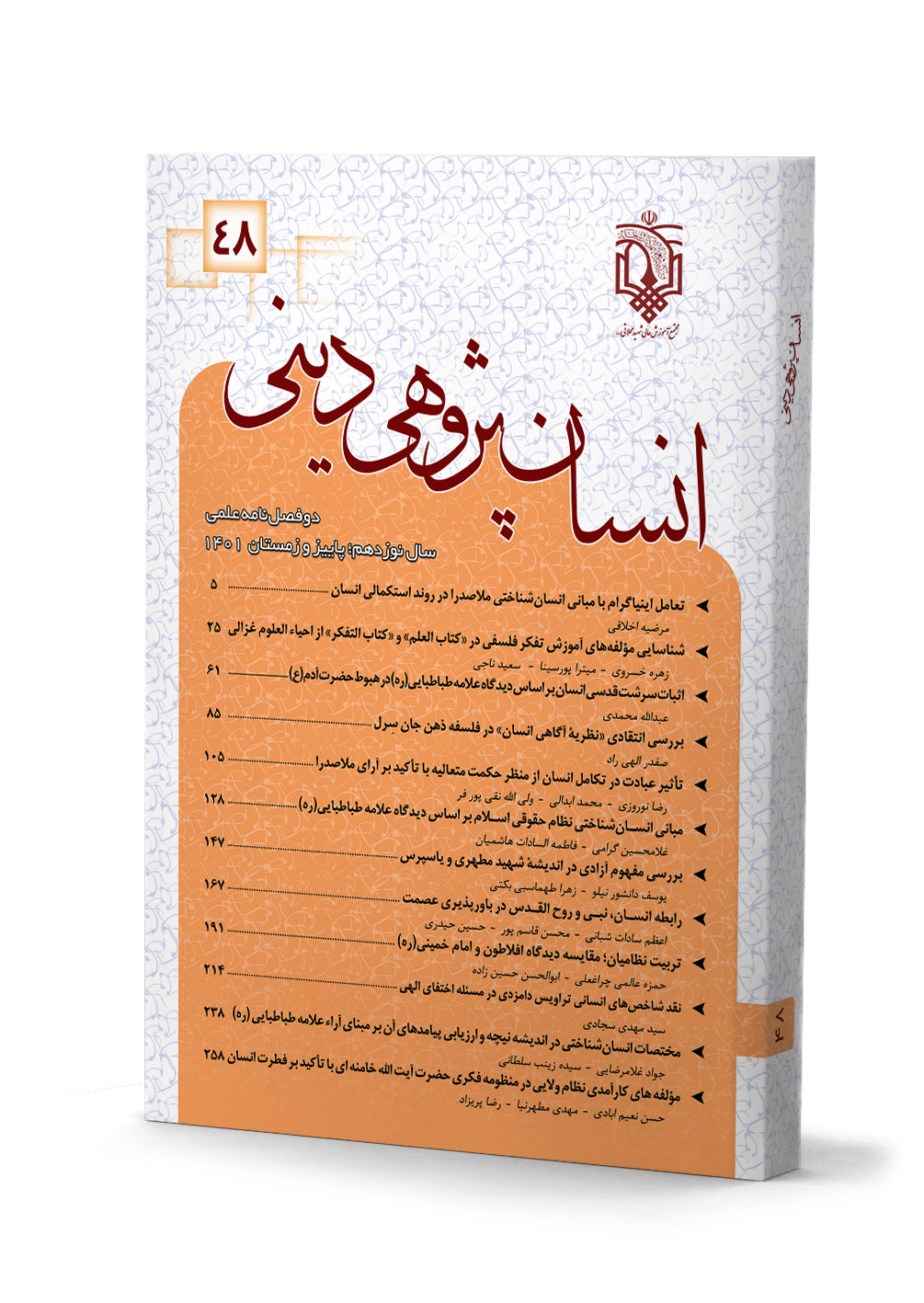Investigating the Concept of Freedom in the Views of Shahid Motahari and Jaspers
Document Type : Research Paper
Authors
1 Associate Professor in Department of Kalam and Philosophy of Religion, Imam Khomeini Education and Reserch Institute, Qom, Iran.
2 PhD Candidate in Religious studies.University of Religions and Denominations, Qom, Iran.
10.22034/ra.2023.545468.2736
Abstract
Freedom has attracted attention in the long run of history. A glance at the history of philosophy shows that the theory of human freedom has been long discussed. Freedom has been a critical need and a standard in the social and individual life of Man. Therefore, states build popular credibility only when they secure their relationship with freedom according to the regulations and conditions. Yet, despite the agreement on the efficiency of this concept in governments and communities, philosophers and thinkers have disputed the quality and quantity of applying freedom. Among these thinkers, Shahid Motahari and Jaspers hold valuable views on freedom. Thus, this research is intended to explain the concept of freedom and investigate this concept from the views of Shahid Motahari and Jaspers. It was revealed that both thinkers view freedom as a critical issue in human life. Also, they believe that valuable freedom is one that pertains to God. In the view of both thinkers, freedom is the point of distinction between humans and non-humans. However, Shahid Motahari believes that freedom is a path toward elevation while Jaspers stays loyal to the freedom itself and puts emphasis on it. This descriptive-analytical research is conducted through the library method.
Keywords
- اوجینو کاوانا، آندره و نانی، آندره (1396)، نظریههای آگاهی در فلسفه ذهن و مغزپژوهی امروز، ترجمه سعید صباغیپور، تهران: ارجمند.
- بابایی، غلامرضا (1382)، فرهنگ سیاسی، تهران، انتشارات آشیان، چاپ اول.
- برلین، آیزیا (1368)، چهار مقاله در باره آزادی، ترجمه محمدعلی موحد، تهران: خوارزمی.
- بلاکهای، د.ج (1357)، اندیشه هستی، ترجمه باقر پرهام، تهران: طهوری.
- دژاکام، علی (1377)، معرفت دینی (تحلیلی از نظرگاههای شهید مطهری)، تهران: مرکز پژوهشهای اسلامی.
- دهخدا، علیاکبر (1372)، لغتنامه، تهران: دانشگاه تهران.
- کین، سم (1393)، گابریل مارسل، ترجمه: مصطفی ملکیان، تهران: هرمس.
- مارسل، گابریل (1382)، فلسفه اگزیستانسیالیسم، ترجمه: شهلا اسلامی، چاپ دوم، تهران: نگاه معاصر.
- مصباح یزدی، محمدتقی (1381)، دین و آزادی، قم: مرکز مطالعات و پژوهشهای حوزه علمیه.
- مطهری، مرتضی (1375)، ختم نبوت، مجموعه آثار، تهران: صدرا.
- ــــــــــــــ (1370)، فطرت، تهران: صدرا.
- ــــــــــــــ (1372)، جامعه و تاریخ، تهران: صدرا.
- ــــــــــــــ (1374)، علل گرایش به مادیگری، تهران: صدرا.
- ــــــــــــــ (1386)، مجموعه آثار، تهران: صدرا.
- ــــــــــــــ (1373)، فلسفه اخلاق، تهران: صدرا.
- ــــــــــــــ (1389)، بیست گفتار، تهران: صدرا.
- مک کواری، جان (1377)، فلسفه وجودی، ترجمه محمد سعید حنایی کاشانی، تهران: هرمس.
- نصری، عبدالله (1389)، خدا و انسان در فلسفه یاسپرس، تهران: دفتر نشر فرهنگ اسلامی.
- ــــــــــــــ (1383)، انسان از دیدگاه اسلام، تهران، پیامنور.
- نقیبزاده، میر عبدالحسین (1372)، در آمدی به فلسفه، تهران: طهوری.
- نوالی، محمود (۱۳۷۹)، فلسفههای اگزیستانس و اگزیستانسیالیسم تطبیقی، تبریز: دانشگاه تبریز.
- ــــــــــــــ (1383)، نگرش اگزیستانسیالیستی در حوزههای فلسفه، انسان، شناخت، فلسفه تطبیقی، مجموعه مقالات، تبریز: دانشگاه تبریز.
- وال، ژان آندره (1372)، پدیدارشناسی و فلسفههای هست بودن، ترجمه یحیی مهدوی، تهران: خوارزمی.
- ــــــــــــــ (1357)، اندیشه هستی، ترجمه: باقر پرهام، تهران: کتابخانه مرکز اسناد و مرکز دائرة المعارف بزرگ اسلامى.
- یاسپرس، کارل (1357)، افلاطون، ترجمه محمدحسن لطفی، چاپ اول، تهران: خوارزمی.
- ــــــــــــــ (1374)، عالم در آیینه تفکر فلسفی، ترجمه: محمود عبادیان، تهران: پرسش.
- ــــــــــــــ (1378)، کوره راه خرد: درآمدی به فلسفه، ترجمه: مهبد ایرانیطلب، تهران: قطره.
- نقیبزاده، میر عبدالحسین (1372)، در آمدی به فلسفه، تهران: انتشارات طهوری.
- Babaei, Gholamreza (2003), Political Culture, Tehran: Ashian Publications, first Edition.
- Berlin, Isaiah (1989), Four Articles on Freedom, translated by Mohammad Ali Movahed, Tehran: Kharazmi.
- Dehkhoda, Ali Akbar (1993), Dictionary, Tehran: University of Tehran.
- Caine, Sam (2014), Gabriel Marcel, translated by Mostafa Malekian, Tehran: Hermes.
- Marcel, Gabriel (2003), Philosophy of Existentialism, translated by Shahla Eslami, first and second editions, Tehran: Contemporary View.
- Mesbah Yazdi, Mohammad Taghi (2002), Religion and Freedom, Qom: Center Of Cultural Studies and Research, Seminary, first Edition.
- Motahari, Morteza (2007), Collection of works, Tehran: Sadra.
- Motahari, Morteza (2010), Twenty Speeches, Tehran: Sadra.
- Macquarie, John (1998), Existential Philosophy, translated by Mohammad Saeed Hanaei Kashani, Tehran: Hermes.
- Nasri, Abdullah (2010), God and Man in the Philosophy of Jaspers, Tehran: Islamic Culture Publishing Office.
- Nasri, Abdullah (2004), Man in the perspective of Islam, Tehran: Payame Noor.
- Naqibzadeh, Mir Abd al-Hussein (1993), Introduction on Philosophy, Tehran: Tahoori.
- Navali, Mahmoud (2000), Philosophies of Existential and Comparative Existentialism, Tabriz: University of Tabriz.
- Navali, Mahmoud (2004), Existentialist Attitudes in the Fields of Philosophy, Humanity, Cognition, Comparative Philosophy, Collection of Articles, Tabriz: University of Tabriz.
- Wall, Andre John (1993), Phenomenology and Philosophies of Existence, translated by Yahya Mahdavi, Tehran: Kharazmi.
- Wall, Andre John (1978), The Thought of Existence, translated by Bagher Parham, Tehran: Library of the Center for Documents and the Center of the Great Islamic Encyclopedia.
- Jaspers, Carl (1978), Plato, translated by Mohammad Hassan Lotfi, first edition, Tehran: Kharazmi.
- Jaspers, Carl (1995), The World in the Mirror of Philosophical Thought, translated by Mahmoud Ebadian, Tehran: Porsesh.
- Jaspers, Carl (1378), The Furnace of Wisdom: An Introduction on Philosophy, translated by Mahbod Iranitalab, Tehran: Qatreh.
- Jaspers, K., (1991), Nachlaß zur philosophischen Logik, hrgs. von H. Saner/M. Hänggi, München, Piper Verlag.
